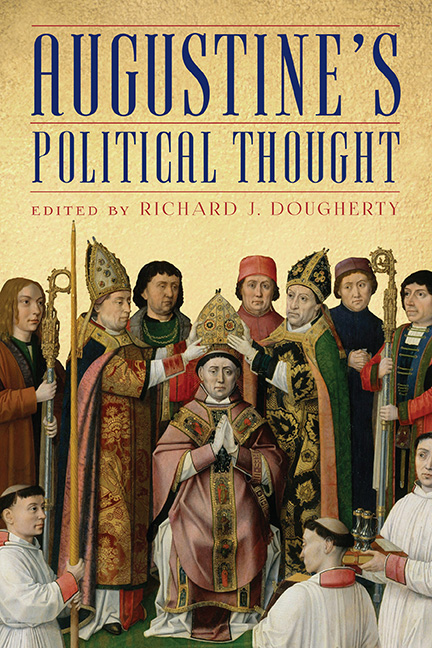Book contents
- Frontmatter
- Contents
- Acknowledgments
- Introduction
- Part 1 Politics, Nature, and Virtue
- 1 St. Augustine and the Problem of Political Ethics in The City of God
- 2 The Other Happy Life: The Political Dimensions to St. Augustine's Cassiciacum Dialogues
- 3 Peace in the Order of Nature: Augustine, Giles, and Dante
- 4 Deeds and Words: Latreia, Justice, and Mercy in Augustine's Political Thought
- 5 The Investigation of Justice in Augustine's Confessions
- Part 2 St. Augustine and Ancient Political Philosophy
- Notes on Contributors
- Index
4 - Deeds and Words: Latreia, Justice, and Mercy in Augustine's Political Thought
from Part 1 - Politics, Nature, and Virtue
Published online by Cambridge University Press: 26 June 2019
- Frontmatter
- Contents
- Acknowledgments
- Introduction
- Part 1 Politics, Nature, and Virtue
- 1 St. Augustine and the Problem of Political Ethics in The City of God
- 2 The Other Happy Life: The Political Dimensions to St. Augustine's Cassiciacum Dialogues
- 3 Peace in the Order of Nature: Augustine, Giles, and Dante
- 4 Deeds and Words: Latreia, Justice, and Mercy in Augustine's Political Thought
- 5 The Investigation of Justice in Augustine's Confessions
- Part 2 St. Augustine and Ancient Political Philosophy
- Notes on Contributors
- Index
Summary
The number of interpretations of Augustine's political theory testifies simultaneously to the depth of his text and to its moments of ambiguity. Depending on whom you read, Augustine is a political thinker and practitioner impeded by his longing for the next world, a forerunner of Hobbesian regimes, or an early pluralist whose skepticism and theory of conscience contribute to modern and postmodern political projects. In John Milbank we see a theocratic Augustine who casts the church as the societas perfectas, whereas both Gilbert Meilander and Jean Bethke Elshtain emphasize instead the limitations of earthly politics that exist alongside the political obligations of a Christian.
Pierre Manent presents us with a portrait of Augustine as a theorist of the “science of the Romans” Manent's reflections are, for our purposes, the most relevant starting point. For Manent, Augustine is one of the last thinkers in the Western canon to recognize both “the passionate interest in this world as expressed in active participation in the common thing” and “the passionate interest in the eternal and the infinite as expressed in the postulation of another world.” Augustine is trying the “old city by the new,” and in doing so characterizes the operation of the passions for liberty, domination, and glory involved in Roman politics, passions that recur for Augustine in political practice generally. In contrast to the problematic dynamic that these competing desires cause for Roman conceptions of virtue, in Augustine's estimation “true virtue, the virtue that does not lie, the virtue that does not make believe it conquers when it is defeated, must, so to speak, integrate the fact that humans cannot be completely happy in this life.” According to Augustine, true virtue is a powerful concept, bridging this world and the next, relating virtue to the emotional life in a way that causes men and women both to process and to accept the situation of incomplete happiness they can possess on earth and to be conformed to the good in this life.
Robert Dodaro, Eric Gregory, and John von Heyking, in their works on Augustine, all point toward book 10 of The City of God as an interpretive key for understanding what Augustine's full teaching of virtue is, and how it relates to his ethical and political theory.
- Type
- Chapter
- Information
- Augustine's Political Thought , pp. 74 - 104Publisher: Boydell & BrewerPrint publication year: 2019

